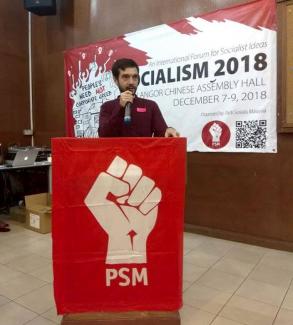
BETWEEN December 7-9 2018, the Parti Sosialis Malaysia held an international Socialism 2018 Conference at Kuala Lumpur, with the theme ‘People’s Need Not Corporate Greed’. Kavita Krishnan, Politburo member of CPI(ML) attended the Conference. Other guests included Sue Bolton of Australia's Socialist Alliance, Cem Sey of Die Linke in Germany, Prabir Purkayastha of CPI(M), and Marco Fernandes of Brazil's Landless Workers' Movement.
Topics for the various panels included "America under Trump, the New World Order?", "#MeToo: Challenging Sexism and the System, Immigration a Global Crisis, Precariat the New Working Class?", and "Challenges to the International Left: Victories and Setbacks and 200 years of Karl Marx”.
Presentations by PSM secretary-general A. Sivarajan, and leaders S. Arutchelvan and former MP Dr Michael Jeyakumar Devaraj shed light on the new and exciting situation in Malaysia, where a broad united front of Opposition parties - called Pakistan Harapan, headed by 92-year-old former Malaysian Prime Minister Mahathir Mohamad - won a historic victory and defeated the authoritarian Barisan Nasional coalition which had been in power 60 years. The election had proved a challenge for the PSM which was not part of the Opposition coalition, and failed to win any seats. The PSM leaders pointed out that the new Government headed by Mahathir, was adopting many economic policies that went against the poor, and in this backdrop, there was a rise in racist and Islamist forces. Even as the Conference was on, there was a massive rally of some 55000 people in Kuala Lumpur, against the proposal by the multi-ethnic Mahathir Government to ratify a U.N. convention on eliminating racial discrimination. The proposal was interpreted as a move to undo the ‘bumiputra’ (sons of the soil) affirmative action policies favouring Malays. PSM leaders were not in favour of rushing to undo the bumiputra policies which they hesitated to equate with racial ‘discrimination’ against non-Malay races. They felt that any measures to protect the non-Malay races from discrimination must come through winning the confidence of ordinary poor Malays as well. The Government’s neoliberal policies that went against the poor, created alienation and ground for racial and xenophobic mobilisation against the bogey of the UN convention. (Malaysia eventually refused to ratify the UN Convention).
The Conference saw lively discussions and debates, for instance over whether unorganised workers ought be called “precariat” and if there was in fact a distinction between “precariat” and “proletariat.” Comrade Sivarajan Arumugam of PSM had presented on British economist Guy Standing’s definition of the “precariat” as distinct from proletariat. This view was disputed by Jacob Andrewartha of the Socialist Alliance, Australia, who shared his own experience of working in precarious jobs in Australia and suggested that it made little sense to see “precariat” as anything but a huge segment of the proletariat.
Responding to these presentations, the Indian participants - Prabir Purkayastha and Kavita Krishnan - both made the point, based on India’s experience, that it would not be accurate to see “precariat” as distinct from proletariat. Most features of what British identified as markers of the “precariat” would have fit the Irish worker in Engels’ Britain, for instance. And in India, communist-led Unions mobilise large numbers of unorganised and contractualised workers who are very much a precarious and insecure segment of the proletariat.
Along with Kavita Krishnan, Rozana Isa from Sisters in Islam and Nisha Ayub from Justice for Sisters participated in the panel on #MeToo: Sexism and the System. The session on Challenges to International Left, Victories & Setbacks was also very interesting, with Marco Fernandes speaking of the shock victory of the far-right Jair Bolsonaro in Brazil, using systematic fake news on social media in a manner very familiar to Indians under Modi. The presentation by Pablo Bustinduy, a young MP from Spain’s Podemos in this panel was inspiring and energetic. Prabir Purkayastha gave a very well-researched presentation on the new features of capitalism today and its implications for Left strategies of mobilising the working class.
Liberation Archive
- 2001-2010
-
2011-2020
- 2011
- 2012
- 2013
- 2014
- 2015
- 2016
- 2017
- 2018
-
2019
- JANUARY-2019
-
FEBRUARY-2019
- Republic Day 2019: Rescue India from the Modi Disaster Rebuild Indian Democracy
- 10% EBC Reservation: Expose and Rebuff the Modi Government's Desperate Deflection Tactics
- New Year Begins With New Hope
- Citizenship and Sedition: BJP's Communal And Repressive Agenda
- All India Workers' Strike 2019
- Repression Unleashed On Daikin Workers
- Indefinite Strike by Mid-Day Meal Cooks in Bihar
- The Bhojpur Revolutionaries Fought For Freedom, Equality, Justice And Unity
- 15th Martyrdom Day of Mahendra Singh : Rally Pledges to Defeat BJP, Hoist Red Flag Over Bagodar
- Socialism 2018: People's Need Not Corporate Greed
- A Conversation With A Young MP From Spain's Podemos
- Somyot's Story Affirms The Importance of International Solidarity
- With Trumpets Blazing : Martyrdom Centenary of Rosa Luxemburg and Karl Liebknecht
- SD: Saroj Dutta and his Times
- Mrinal Sen (1923-2018)
- "Universal Basic Income" : The Next 'Jumla'?
- MARCH-2019
- APRIL-2019
- May-2019
- LIBERATION, JUNE 2019
- Liberation JULY 2019
- LIBERATION, August 2019
- Liberation, SEPTEMBER 2019
- Liberation, OCTOBER 2019
- Liberation, NOVEMBER 2019
- Liberation, DECEMBER 2019
- 2020
- 2021-2030
Charu Bhawan, U-90, Shakarpur, Delhi 110092
Phone: +91-11-42785864 | Fax:+91-11-42785864 | +91 9717274961
E-mail: info@cpiml.org







